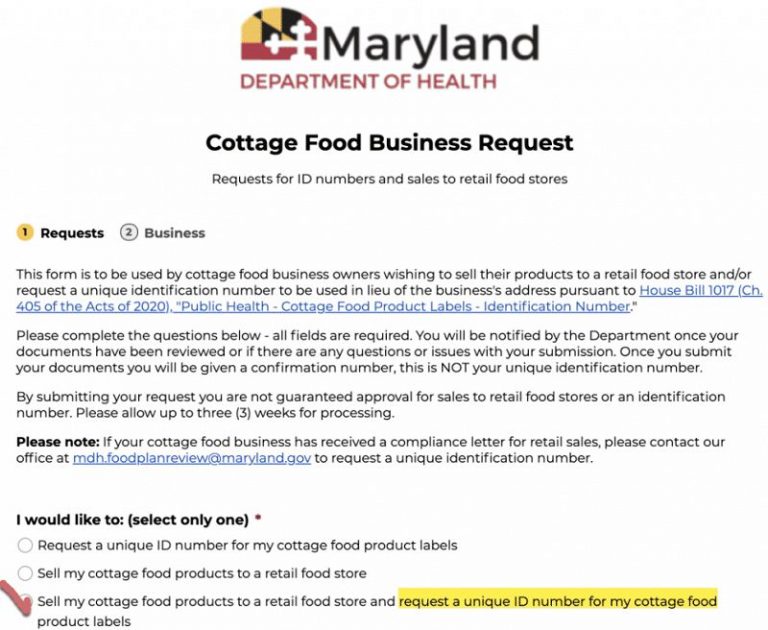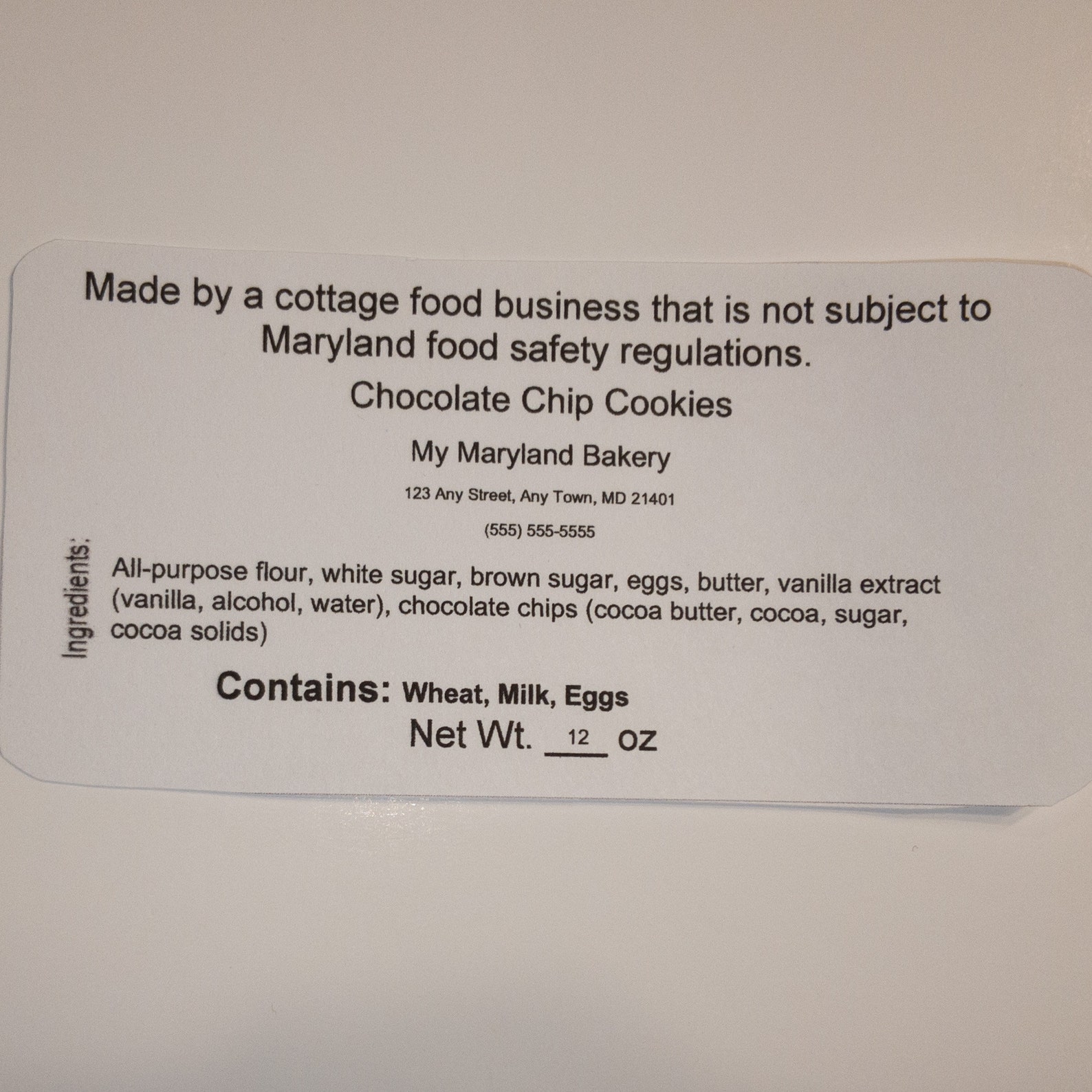The Maryland Cottage Meals Legislation has opened doorways for aspiring meals marketers, letting them percentage their culinary creations with the neighborhood. This complete information delves into the intricacies of the regulation, offering a transparent roadmap for navigating its necessities and maximizing your cottage meals industry’s doable.
Definition and Assessment of Maryland Cottage Meals Legislation

The Maryland Cottage Meals Legislation, enacted in 2012, goals to fortify small-scale meals companies via permitting people to provide and promote sure non-potentially hazardous meals pieces from their house kitchens. It encourages entrepreneurship, promotes native meals programs, and gives shoppers with get right of entry to to distinctive, selfmade merchandise.
To promote cottage meals merchandise in Maryland, people should agree to particular necessities Artikeld via the regulation. Those come with acquiring a Cottage Meals Allow from the Maryland Division of Well being, following meals protection tips, and adhering to packaging and labeling rules.
Cottage meals companies should additionally function inside sure income limits and are topic to periodic inspections.
Allowed Cottage Meals Merchandise
The Maryland Cottage Meals Legislation allows the manufacturing and sale of a variety of non-potentially hazardous meals pieces, together with:
- Baked items (e.g., cookies, desserts, pies, cakes)
- Sweet and confections (e.g., fudge, caramels, brittles)
- Jams, jellies, and preserves
- Pickles and relishes
- Dried vegetables and fruit
- Granola and path combine
- Espresso and tea
- Popcorn
Prohibited Cottage Meals Merchandise
Positive meals pieces are prohibited underneath the Maryland Cottage Meals Legislation because of protection issues. Those come with:
- Doubtlessly hazardous meals (e.g., meat, poultry, dairy merchandise, eggs)
- Meals that require refrigeration
- Meals containing uncooked or undercooked components
- Meals which can be processed or preserved in a way that calls for particular apparatus or licensing
Licensing and Registration Procedure
To function a cottage meals industry in Maryland, you should download a license from the Maryland Division of Well being (MDH).
The licensing procedure comes to filing an software, paying a rate, and offering sure documentation. The applying may also be discovered at the MDH web site.
Charges and Documentation
- The licensing rate is $50.
- You should additionally supply evidence of a meals handler’s card.
- You should additionally post a flooring plan of your kitchen.
Timeline
The applying procedure in most cases takes 30 days to finish.
Labeling and Packaging Necessities

To make sure the security and transparency of cottage meals merchandise, Maryland has established particular labeling and packaging necessities. Adhering to those tips is an important for cottage meals companies to function legally and care for client self belief.
Required Label Data
Cottage meals labels should prominently show the next knowledge:
- Product identify
- Web weight or quantity
- Entire listing of components, together with allergens (in daring or highlighted)
- Identify and cope with of the cottage meals industry
li>Touch knowledge (telephone quantity or e mail cope with)
Packaging Requirements
Cottage meals merchandise should be packaged in a way that protects them from contamination and guarantees their high quality. Not unusual packaging fabrics come with sealed packing containers, resealable baggage, or vacuum-sealed applications.
Instance of a Compliant Label
The next is an instance of a compliant label for a cottage meals product:
Apple Pie
Web weight: 8 ounces
Substances: Apples, sugar, cinnamon, nutmeg, flour, butter
Made via: Sarah’s Candy Treats
123 Primary Side road, Anytown, MD 12345
Touch: (555) 123-4567 | sarahssweettreats@e mail.com
Manufacturing and Garage Requirements
To make sure the security and high quality of cottage meals merchandise, Maryland has established particular manufacturing and garage requirements that cottage meals companies should adhere to. Those requirements intention to care for a blank and sanitary manufacturing surroundings and keep watch over the temperature and garage prerequisites of cottage meals merchandise.
Blank and Sanitary Manufacturing Atmosphere
- Cottage meals companies should function in a blank and sanitary surroundings that stops contamination of meals merchandise.
- Meals preparation spaces should be often wiped clean and disinfected, and all apparatus and utensils should be sanitized ahead of and after use.
- Non-public hygiene is very important, and meals handlers should wash their arms totally ahead of dealing with meals and put on blank clothes and hair coverings.
- Pets and different animals should be excluded from meals preparation and garage spaces.
Temperature and Garage Stipulations
- Cottage meals merchandise should be saved at suitable temperatures to stop spoilage and the expansion of destructive micro organism.
- Perishable meals, reminiscent of baked items with cream cheese or meat fillings, should be refrigerated at or beneath 41°F (5°C).
- Non-perishable meals, reminiscent of cookies and crackers, should be saved in a fab, dry position clear of direct daylight.
- Cottage meals companies should track temperatures often and care for information to verify compliance with garage necessities.
Gross sales and Advertising Channels
Maryland’s cottage meals regulation establishes particular tips for the sale and advertising of cottage meals merchandise. Adhering to those rules is an important for companies to function legally and care for client protection.
Approved Gross sales Channels
Cottage meals merchandise in Maryland may also be bought via more than a few accredited channels, together with:
- Farmers’ markets
- Farm stands
- Group-supported agriculture (CSA) systems
- On-line platforms (with restrictions)
- Direct gross sales to shoppers on the manufacturer’s place of dwelling
Barriers on Gross sales Quantity and Distribution Strategies
To make sure the security and high quality of cottage meals merchandise, Maryland regulation imposes sure barriers on gross sales quantity and distribution strategies:
- Annual gross sales should no longer exceed $25,000.
- Merchandise can’t be shipped or bought out of doors of Maryland.
- Wholesale distribution to retail shops is unlawful.
A success Advertising Methods
In spite of the restrictions, cottage meals companies in Maryland can enforce efficient advertising methods to succeed in their audience and develop their operations. Some a success approaches come with:
- On-line presence:Making a web site and social media profiles to show off merchandise and connect to shoppers.
- Group engagement:Collaborating in native occasions, farmers’ markets, and CSA systems to construct relationships and generate gross sales.
- Collaboration:Partnering with different native companies to provide complementary merchandise or services and products.
- Phrase-of-mouth advertising:Encouraging happy shoppers to percentage their certain reviews with others.
Enforcement and Compliance
The Maryland Division of Well being is answerable for implementing the Cottage Meals Legislation. The dept has the authority to investigate cross-check cottage meals operations, acquire samples for trying out, and factor citations for violations.Consequences for violations of the Cottage Meals Legislation can come with fines of as much as $1,000 consistent with violation.
As well as, the dept might droop or revoke a cottage meals license for repeated violations.
Sources for Cottage Meals Companies
The Maryland Division of Well being supplies various assets to assist cottage meals companies agree to the Cottage Meals Legislation. Those assets come with:
- A information to the Cottage Meals Legislation
- A truth sheet on cottage meals protection
- A listing of licensed cottage meals merchandise
- A listing of cottage meals companies
Cottage meals companies too can touch the Maryland Division of Well being for more info in regards to the Cottage Meals Legislation and how you can agree to it.
Case Research and Good fortune Tales: Maryland Cottage Meals Legislation

The Maryland cottage meals business boasts a plethora of thriving companies that function beacons of inspiration for aspiring marketers. Those ventures have no longer most effective carved a distinct segment for themselves within the culinary panorama however have additionally demonstrated the immense doable of the cottage meals sector.
Their luck tales be offering precious insights into the original merchandise, efficient advertising methods, and priceless courses realized alongside the way in which. Via delving into those case research, budding cottage meals marketers can achieve a wealth of information and steering to navigate the demanding situations and maximize the alternatives that lie forward.
Case Find out about: Candy Give up Bakery
Candy Give up Bakery, helmed via the proficient baker Emily Carter, has develop into a cherished vacation spot for delectable baked items in Annapolis. Emily’s pastime for developing mouthwatering treats shines via in her meticulously crafted desserts, cookies, and pastries.
Emily’s business plan revolves round showcasing her creations on social media platforms and partnering with native espresso retail outlets and farmers’ markets. Via setting up a robust on-line presence and fostering relationships with native companies, she has successfully expanded her achieve and attracted a faithful buyer base.
One of the most key courses Emily has realized is the significance of keeping up fine quality requirements and adapting to buyer comments. Via being attentive to her shoppers’ personal tastes and steadily refining her recipes, she has ensured that Candy Give up Bakery stays a best choice for discerning dessert enthusiasts.
Case Find out about: The Spice Service provider, Maryland cottage meals regulation
The Spice Service provider, based via the culinary fanatic Sarah Patel, has won popularity for its fragrant spice blends and flavorful marinades. Sarah’s deep wisdom of spices and her dedication to the use of recent, fine quality components have set her merchandise aside within the aggressive spice marketplace.
Sarah’s business plan makes a speciality of instructing shoppers in regards to the versatility and well being advantages of spices. Via workshops, on-line tutorials, and collaborations with native cooks, she has effectively situated The Spice Service provider as a depended on supply for culinary inspiration.
Sarah’s adventure has taught her the significance of establishing sturdy relationships with providers and exploring leading edge tactics to package deal and marketplace her merchandise. Via sourcing spices without delay from farmers and experimenting with distinctive packaging designs, she has created a emblem that resonates with each house chefs {and professional} cooks.
Most sensible FAQs
What sorts of merchandise are allowed underneath the Maryland Cottage Meals Legislation?
Baked items, jams and jellies, honey, fruit butters, sweet, and sure non-potentially hazardous meals.
What are the labeling necessities for cottage meals merchandise in Maryland?
Labels should come with the identify and cope with of the manufacturer, an inventory of components, allergen knowledge, and a commentary indicating that the product is selfmade and no longer topic to state inspection.
How do I sign up my cottage meals industry in Maryland?
You’ll sign up on-line during the Maryland Division of Well being’s web site. The registration rate is $50.

